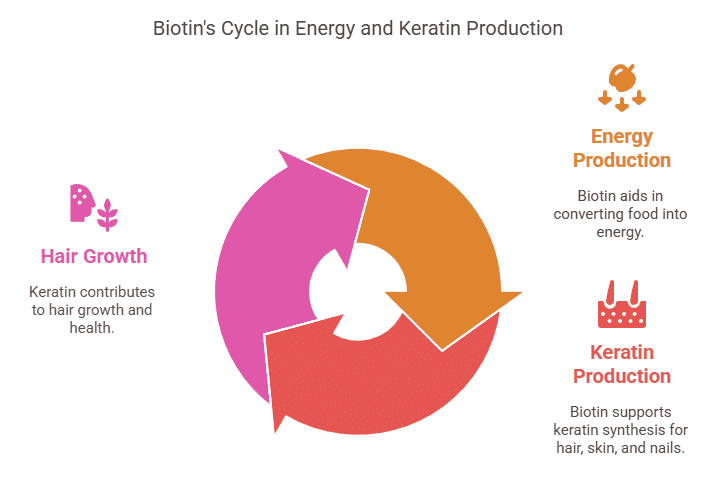Blog
Does Biotin Help Hair Growth? The Truth Behind the #1 Hype
Does biotin help hair growth? It’s the question that’s probably brought you here, and honestly, it’s one I’ve wrestled with myself. Picture this: You’re scrolling through social media, and every other ad promises thicker, fuller hair with just one simple supplement. Biotin bottles line pharmacy shelves like soldiers ready for battle against thinning hair. In this article we will answer the million-dollar question: does biotin actually help hair growth, or are we all just buying into beautifully marketed hope?
I’ve been down this rabbit hole myself, and let me tell you—the answer isn’t as straightforward as those glossy before-and-after photos suggest. So grab your favorite beverage, and let’s dive into the real science behind biotin and hair growth.
Table of Contents
What Exactly Is Biotin, and Why Does Everyone Think It’s Magic?
Biotin, also known as vitamin B7 or vitamin H (from the German “Haar und Haut,” meaning “hair and skin”), is a water-soluble vitamin that plays a crucial role in your body’s energy production. Think of it as your cellular metabolism’s best friend—it helps convert the food you eat into usable energy.
But here’s where it gets interesting for your hair: biotin is essential for keratin production—the protein that makes up your hair, skin, and nails. This connection has led to the widespread belief that more biotin equals more hair growth. It’s logical, right? Well, biology isn’t always that simple.

The Science Behind Biotin and Hair Growth: What Research Actually Shows
Let’s cut through the marketing noise and look at what peer-reviewed research tells us. According to a comprehensive 2024 review published in the Journal of Clinical and Aesthetic Dermatology, only three studies met the criteria for evaluating biotin’s effectiveness as a hair supplement.
Here’s what those studies revealed:
The Gold Standard Study (Spoiler: It’s Not What You’d Expect)
The highest-quality research was a double-blind, placebo-controlled study from 1966. Researchers gave 28 women with diffuse alopecia 10mg of biotin daily, while 18 women received a placebo. After four weeks, both groups showed improvement from baseline, but there was no significant difference between the biotin and placebo groups.
Let that sink in for a moment. The most rigorous study we have shows biotin performed no better than a sugar pill.
The Specialized Cases
Two other studies looked at specific populations:
- Isotretinoin users: Patients taking this acne medication who also took 10mg of biotin daily showed a shift toward anagen (growth phase) hairs, though both groups still experienced decreased hair density.
- Post-surgery patients: Among women with hair loss after sleeve gastrectomy, only 23% of biotin-deficient patients reported improvement with biotin supplementation. Surprisingly, 38% of biotin-sufficient patients also reported improvement—suggesting a strong placebo effect.
Who Actually Benefits from Biotin Supplementation?
Here’s where things get more nuanced. Biotin supplementation can help with hair growth, but only in specific circumstances:
You Might Benefit If You Have:
- Biotinidase deficiency: A rare genetic disorder affecting biotin recycling
- Chronic alcohol use: Alcohol inhibits biotin absorption
- Inflammatory bowel diseases: Conditions like Crohn’s disease can reduce biotin production
- Malnutrition: Inadequate food intake leading to nutrient deficiencies
- Pregnancy or breastfeeding: Increased biotin needs during these periods
- Certain medications: Antiepileptics and retinoids can lower biotin levels
🧬 Do You Actually Need Biotin?
Take this science-based assessment to find out if biotin supplementation might benefit you
The Reality Check
For most healthy individuals eating a balanced diet, biotin deficiency is extremely rare. According to the National Institutes of Health, the average American consumes 35-70 mcg of biotin daily through food alone, which exceeds the recommended adequate intake of 30 mcg.
| Food Source | Biotin Content (mcg) | % Daily Value |
|---|---|---|
| Beef liver (3 oz) | 30.8 | 103% |
| Whole egg | 10 | 33% |
| Salmon (3 oz) | 5 | 17% |
| Pork chop (3 oz) | 3.8 | 13% |
| Sunflower seeds (1/4 cup) | 2.6 | 9% |
| Sweet potato (1/2 cup) | 2.4 | 8% |
The Mane Growth Elixir Difference: A Comprehensive Approach
While standalone biotin supplementation shows limited evidence for hair growth in healthy individuals, comprehensive formulations that address multiple aspects of hair health may offer better results. The Mane Growth Elixir takes a different approach by combining over 40 natural botanicals and nutrients that work synergistically.
Key Ingredients That Actually Support Hair Growth:
Adaptogenic Powerhouses:
- Gotu Kola: Improves circulation and reduces inflammation
- Ginseng: Supports blood flow and may reduce stress-induced shedding
- Tulsi (Holy Basil): Helps balance cortisol levels
Follicle Stimulators:
- Bhringraj: Traditional Ayurvedic herb for hair regrowth
- Peppermint Oil: Stimulates scalp circulation
- Ginkgo Biloba: Increases blood flow to hair follicles
DHT Blockers:
- Saw Palmetto: Natural DHT inhibitor
- Pumpkin Seed Oil: Anti-inflammatory and DHT-blocking properties
- Black Seed Oil: Regenerative and anti-inflammatory
Does Biotin Help with Stress-Related Hair Loss?
Here’s where biotin might actually play a supporting role. Stress-related hair loss (telogen effluvium) can benefit from comprehensive nutritional support, and biotin is part of that equation—though not the star of the show.
The Mane Growth Elixir’s adaptogenic ingredients like Gotu Kola, Ginseng, and Tulsi help address the root cause of stress-related hair loss while providing scalp-nourishing support. It’s like having a full orchestra instead of a solo violin performance.
The Hidden Dangers of High-Dose Biotin
Before you rush to buy the highest-dose biotin supplement you can find, here’s something most companies won’t tell you: high-dose biotin can interfere with laboratory tests, potentially leading to misdiagnosis or missed health conditions.
The FDA has issued warnings about biotin interference with:
- Thyroid function tests
- Cardiac biomarkers (including troponin)
- Hormone levels
- Vitamin D tests
One reported case involved a missed heart attack diagnosis due to biotin interference with troponin testing—a potentially fatal consequence of supplement use.

How Long Does It Take to See Results?
If you’re among the small percentage who might benefit from biotin supplementation, realistic expectations are crucial. Hair growth is a slow process—your hair only grows about half an inch per month under the best circumstances.
For those with actual biotin deficiency, improvements might be noticeable within 3-4 months. However, for most people taking biotin supplements, any perceived improvements are likely due to:
- Placebo effect
- Improved overall nutrition
- Better hair care habits adopted alongside supplementation
- Natural hair growth cycles
The Bottom Line: Does Biotin Help Hair Growth?
Here’s my honest take after diving deep into the research: For most healthy individuals, biotin supplementation alone won’t dramatically improve hair growth. The science simply doesn’t support the widespread marketing claims.
However, if you’re dealing with stress-related hair loss, nutritional deficiencies, or specific health conditions that affect biotin absorption, a comprehensive approach that includes biotin alongside other proven ingredients might be beneficial.
My Recommendations:
- Get tested first: If you suspect biotin deficiency, ask your doctor for proper testing
- Focus on overall nutrition: A balanced diet rich in protein, iron, and vitamins is more important than any single supplement
- Consider comprehensive formulations: Products like the Mane Growth Elixir that address multiple aspects of hair health may be more effective than biotin alone
- Manage stress: Often the biggest factor in hair loss
- Be patient: Real hair growth takes time—beware of any product promising overnight results

Frequently Asked Questions
How much biotin should I take for hair growth? For most people, the adequate intake of 30 mcg daily is sufficient. High doses (5-10mg) found in supplements aren’t necessary unless you have a diagnosed deficiency.
What are the side effects of taking biotin? Biotin is generally safe, but high doses can cause insomnia, excessive thirst, and dangerous interference with lab tests.
How long after taking biotin will I see hair growth? If you have a biotin deficiency, improvements might be visible in 3-4 months. For most people without deficiency, biotin alone won’t produce noticeable changes.
Does biotin really help hair growth? The scientific evidence for biotin helping hair growth in healthy individuals is weak. It only helps if you have a biotin deficiency or specific health conditions.
The Real Talk Conclusion
Look, I get it. We all want that magic bullet for amazing hair. But the truth is, healthy hair growth is more about consistent care, proper nutrition, stress management, and sometimes addressing underlying health issues than popping a single vitamin.
If you’re serious about improving your hair health, consider a comprehensive approach that addresses multiple factors. The Mane Growth Elixir’s blend of adaptogens, circulation boosters, and follicle stimulants offers a more holistic solution than biotin alone.
Remember: your hair is a reflection of your overall health. Instead of chasing the latest supplement trend, focus on building sustainable habits that support your entire well-being. Your hair—and your wallet—will thank you.
Ready to take a science-based approach to hair growth? Consider trying the Mane Growth Elixir, which combines biotin with over 40 other proven ingredients for comprehensive hair support. Because sometimes, the best solution isn’t the simplest one—it’s the most complete one.
Sources: Journal of Clinical and Aesthetic Dermatology, National Institutes of Health Office of Dietary Supplements, FDA Safety Communications


